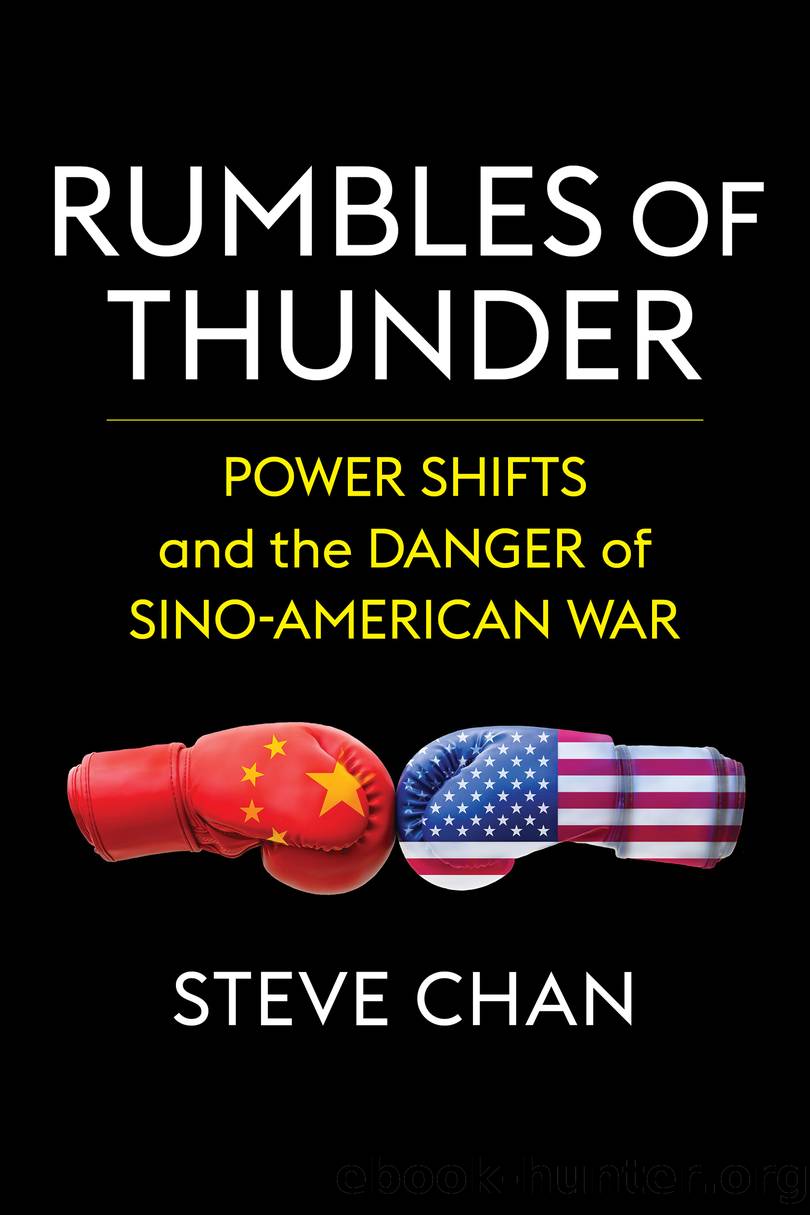Rumbles of Thunder by Steve Chan

Author:Steve Chan
Language: eng
Format: epub
Publisher: Columbia University Press
CONCLUSION
States compete not necessarily for more power or tangible material resources. They also contest for intangible or psychological rewards such as status, recognition, and respect. Besides material goods, people also crave for status, recognition, and respect. They react angrily when they feel that their dignity has been compromised and their legitimate aspirations for their countryâs standing have been denied or frustrated by other countries. Interestingly, when deciding which candidate or party to support, people are more likely to be influenced by their cultural identities and values than their material interests.
Ned Lebow argues that the desire for status, prestige, or gloire has been a much more important source for warfare than the pursuit of security concerns.87 He reports that the quest for standing was present as a primary or secondary motivation in sixty-two of the ninety-four wars involving great powers since 1648. His analysis contributes to understanding the enigma presented earlier, namely, why states continue to spend on their military and recruit allies long after their physical survival and security are assured. This chapter introduces an additional, not necessarily mutually exclusive, explanation, namely, the domestic power and incentives of entrenched interests along with statesâ pursuit of psychological or emotional gratification.
This chapter argues that when people feel that their country has been disrespected or humiliated, or that their political and cultural identities have been threatened, these feelings present a potent force that dispose them to confront each other internationally. Popular sentiments can be especially powerful in domestic politics when they are led and mobilized by elites motivated by a partisan agenda to exploit mass grievances and hijack the nationalist cause. Foreignersâ sanctions can of course affect the material interests of their intended targets but, more important, they challenge a peopleâs sense of identity and their belief about their countryâs place and entitlement in the world. Feelings of national pride and resentments of being disrespected are inherently intangible qualities that are more difficult for leaders to manage or control. Unlike resources that can be more easily divided, such feelings are more likely to inflame public opinion and engender a strong negative sense of being mistreated. Once the genie has been aroused, putting it back in the bottle is difficult.
It is difficult in part because such mass feelings can help politicians score political points and keep them in power. Hard-liners have a vested interest in sustaining hostility directed against a foreign enemy or ethnic minority. In times of tension, national discourse typically gravitates in their favor, empowering them at the expense of the more moderate elements. Politicians and officials often try to outbid one another in demonstrating their patriotic or nationalist credential. This development can start a process that leads to a further deterioration in relations with foreign countries. Thus efforts at foreign coercion can have a blowback effect, getting both sides in a dispute to climb onto an escalator of mutual recrimination and retaliation that will be difficult for them to get off because of domestic partisan considerations. Public opinion and political opposition
Download
This site does not store any files on its server. We only index and link to content provided by other sites. Please contact the content providers to delete copyright contents if any and email us, we'll remove relevant links or contents immediately.
The Secret History by Donna Tartt(19092)
The Social Justice Warrior Handbook by Lisa De Pasquale(12190)
Thirteen Reasons Why by Jay Asher(8912)
This Is How You Lose Her by Junot Diaz(6887)
Weapons of Math Destruction by Cathy O'Neil(6281)
Zero to One by Peter Thiel(5802)
Beartown by Fredrik Backman(5755)
The Myth of the Strong Leader by Archie Brown(5508)
The Fire Next Time by James Baldwin(5447)
How Democracies Die by Steven Levitsky & Daniel Ziblatt(5219)
Promise Me, Dad by Joe Biden(5154)
Stone's Rules by Roger Stone(5088)
A Higher Loyalty: Truth, Lies, and Leadership by James Comey(4964)
100 Deadly Skills by Clint Emerson(4926)
Rise and Kill First by Ronen Bergman(4790)
Secrecy World by Jake Bernstein(4753)
The David Icke Guide to the Global Conspiracy (and how to end it) by David Icke(4720)
The Farm by Tom Rob Smith(4514)
The Doomsday Machine by Daniel Ellsberg(4490)
